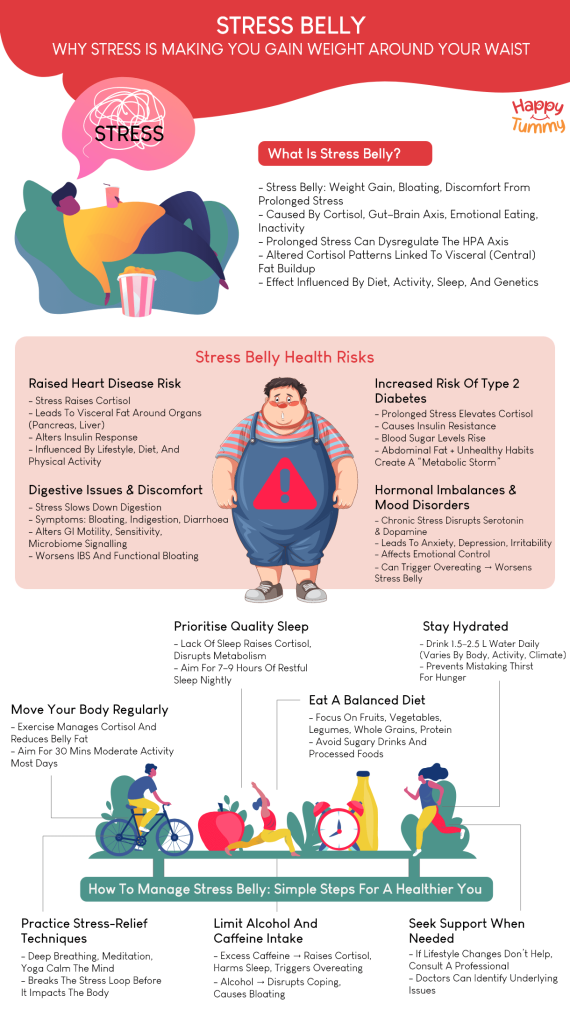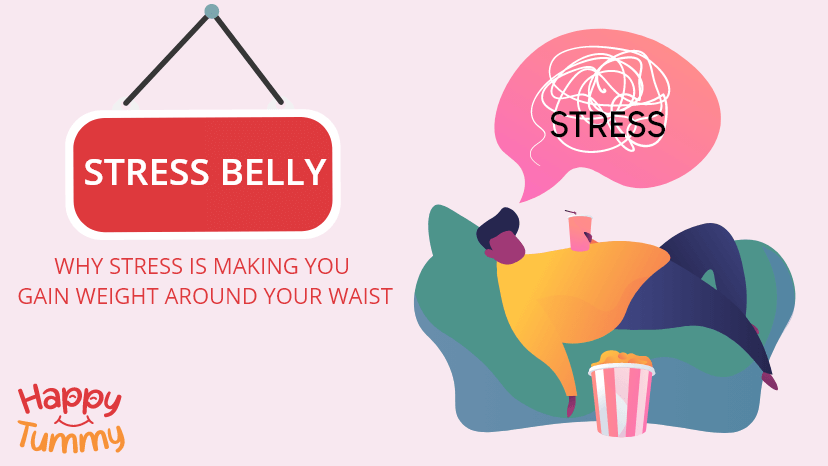Table of Contents
Have you ever wondered why you get a bloated belly due to stress? Stress belly is a condition that many individuals are really aware of, but which remains unrecognised most of the time.
Cortisol is not the only factor that can contribute to a stress belly. Changes in the HPA axis (the body’s stress response system), the gut-brain link, and behaviours like emotional eating can all cause it.
This may not only lead to increased belly fat but also cause bloating and discomfort. We will discuss the effects of stress on your waistline and the tips for managing stress in this blog so that you may manage those stubborn belly fat gains.
What is Stress Belly?
Stress belly refers to weight gain, bloating, and discomfort caused by prolonged stress. Such a reaction is caused by hormones as cortisol and the gut-brain axis, emotional eating, inactivity, etc.[1]
Prolonged stress can dysregulate the hypothalamic-pituitary-adrenal (HPA) axis, leading to altered cortisol patterns.
Chronic elevations or altered cortisol rhythms are associated with greater central (visceral) fat deposition, though this is mediated by diet, activity, sleep and genetics.

Stress Belly Health Risks
Stress belly is not just the discomfort or the problem of bloating, but can lead to several health-threatening issues that impact your health in the long term.
1. Raised Heart Disease Risk
When you become stressed, your body produces cortisol, and other hormone that contributes to the fight or flight response.
Although it assists you in overcoming short-term stress, prolonged exposure to high cortisol may cause you to accumulate fat around your belly, particularly visceral fat.
This type of fat builds up around critical organs, including the pancreas and liver. It can change how the body reacts to insulin and is typically altered by how you live and what you eat.
Stress, eating habits, and physical exercise are all things that can affect how this sort of fat builds up and how to deal with it. [2]
2. Increased Risk of Type 2 Diabetes
Stress over a prolonged period may affect your body’s ability to regulate sugar levels.
Long-term high cortisol levels may cause insulin resistance, whereby the cells of the body will be less responsive to insulin. Consequently, the blood sugar levels are elevated and predispose a person to type 2 diabetes.
Stress combined with unhealthy behaviour and abdominal fat forms an ideal metabolic storm, leading to insulin resistance, which increases the difficulty in the body’s ability to control blood sugar efficiently.[3]
3. Digestive Issues and Discomfort
Stress has a direct impact on the digestive system. Digestion can slow down gastrointestinal processes when your body redirects energy toward non-essential processes under stress. This may cause bloating, indigestion and diarrhoea.
Stress affects GI motility, visceral sensitivity and microbiome-brain signalling — mechanisms that explain worsening of IBS and functional bloating in susceptible individuals.
Chronic stress can upset the smooth balance of the digestive system and cause discomfort.[4]
Aashirvaad Atta has collaborated with a team of qualified dieticians to make an easy-to-take Digestion Quotient test.
It examines in detail your digestive condition and then scores you out of 1-100 on how your digestion is performing. In just 2 minutes, you can find out your Digestive Quotient.
4. Hormonal Imbalances and Mood Disorders
High levels of cortisol due to stress over a long time period not only harm your body but also disrupt other hormones that control mood and emotions.
Stress may cause the body’s hormones, such as serotonin and dopamine, which regulate mood, to become imbalanced.[4]
Such instability may result in anxiety, depression, irritability and inability to control emotions.
Such mood fluctuations may also develop as unhealthy coping skills, including overeating, which makes the stress belly problem worse with time.
How to Manage Stress Belly: Simple Steps for a Healthier You
When you find yourself adding some extra weight around your waist, particularly at times of stress, you are not alone.
The following steps can be taken to help you manage belly stress and live healthier:
1. Move Your Body Regularly
One of the most effective methods for managing stress and reducing belly fat is regular physical activity.
Regular physical activity may help manage cortisol levels, the stress hormone that can contribute to abdominal fat. Aim for at least 30 minutes of moderate-intensity exercise most days, such as walking, cycling, or swimming.[6]
Not only does exercise help in burning calories, but it also may elevate your mood and manage stress, which is a win-win for both your physical and mental health. Get something fun to do; it could be dancing, yoga, or even a simple walk in nature to make exercising fun and maintainable.
2. Practice Stress-Relief Techniques
Breathing deeply, meditating and yoga are all great techniques to relax your mind and manage cortisol levels. Simple steps, such as focusing your breath or practising mindfulness, can interrupt the stress loop and stop it before it can impact your body.
Such methods not only help manage stress, but they also enhance your emotional state, which can promote better nutrition and exercise.
You may feel less stressed and capable of managing day-to-day stress without it being reflected in your waistline.
3. Prioritise Quality Sleep
Did you have any idea that a lack of sleep may make stress belly even worse? Lack of sleep raises the cortisol levels and throws your metabolism off, which makes it more difficult to manage weight, particularly around your belly.
Strive to get a range of 7 to 9 hours of quality sleep a night so that your body has time to repair and stabilise your hormones.[7]
A calming bedtime routine may assist you in falling asleep quickly and enhancing the quality of your sleep.
One way to ensure that you get the most out of sleep is to turn off the screens at least an hour before bedtime, establish a regular sleep schedule and make your sleeping quarters as conducive to sleep as possible by making your sleeping place cool and dark.
Pro tip: Massage your feet with two drops of ghee for a restful night’s sleep.
4. Eat a Balanced Diet
Eating plays a significant role in your stress and belly fat. Make sure to consume a variety of complete foods, such as fruits, vegetables, legumes, whole grains, and good sources of protein. Limit sugary drinks and highly processed meals.
They add extra calories and might hurt your metabolic health. Eating foods high in fibre and keeping your energy levels stable might also assist with cravings that are caused by stress. [8]
Healthy nutrition promotes health and manages the harmful impact of stress.
5. Stay Hydrated
Hydration is an essential part of how your body operates generally and may aid in managing stress.
Sometimes dehydration is confused with hunger, and this makes you eat more than you need; therefore, it is essential to take water regularly.
Depending on your body size, activity level, and the weather, you should drink between 1.5 and 2.5 litres of water per day. Most individuals can trust that drinking when they’re thirsty is a good rule of thumb.
Keep your skin and energy up by staying hydrated and feeling better on the inside and the outside.
6. Limit Alcohol and Caffeine Intake
Although it is tempting to use caffeine to get a burst of energy or alcohol to relieve stress, both might have a detrimental effect on your stress and your belly fat.
Excessive caffeine causes an increase in cortisol levels, leading to problems with sleeping and overeating.
Likewise, alcohol may disrupt your stress coping mechanisms and result in bloating, particularly when taken in large amounts.
Caffeine and alcohol moderation may stabilise your mood, enhance the quality of your sleep, and manage the chance of stress belly accumulation.
Use herbal teas like fennel seed tea, moringa tea, or water as calming substitutes to ensure that the level of cortisol stays down.
7. Seek Support When Needed
At times, stress belly can be difficult to handle by yourself. In case you are not making any progress even after changing your lifestyle, it is helpful to contact a healthcare professional.
An underlying problem, which may be a cause of stress and contribute to a stress belly, can be identified by a healthcare professional.
They can offer personalised guidance and methods of coping with your stress and enhancing your health in general.
With support, you will be able to remain motivated, cope with any eating habits because of emotions, and create a plan that suits you, causing long-term outcomes.
Stress Belly Self-Check
Step 1 – Measure waist circumference
- Use a tape measure at the level of your belly button.
- Note: High waist size = higher risk.
Step 2 – If waist is high or symptoms present, check:
- Blood Pressure (BP)
- Fasting Glucose / HbA1c
- Lipid profile (cholesterol & triglycerides)
Step 3 – Take action
- Begin a structured lifestyle plan:
- Balanced diet
- Regular exercise
- Stress management (sleep, relaxation, mindfulness)
- Balanced diet
Step 4 – Seek professional help if needed
- If no improvement after consistent effort
- Or if red flags appear (sudden weight gain, uncontrolled sugars, very high BP, or persistent fatigue)
Bottom Line
The key to a stress-free belly is having a holistic approach to physical and mental well-being.
Daily exercise, yoga, and sleep are among the ways of managing stress to decrease cortisol and stop the buildup of belly fat.
Eating a healthy diet with whole foods, lean proteins, and healthy fats is an essential aspect of maintaining stable blood sugar levels and curbing cravings, which can help combat stress belly.
Exercising, hydration and minimising alcohol and caffeine consumption will also help you maintain stress levels under control.
Doctors and nutritionists can provide personalised stress management and wellness advice to help you live a better, more balanced life.
The key is habituality; making little changes to reduce stress and improve your life can help you notice the difference and regain control over your health.
Frequently Asked Questions
The body’s reaction to prolonged stress leads to a condition known as a stress belly.
When stressed, your body will discharge cortisol, a hormone that might cause your body to accumulate fat, especially around your abdomen.
This, along with emotional eating, insomnia and digestive difficulties, might lead to bloating, weight gain and belly discomfort.
To alleviate the stress burden, work on developing techniques to manage it through methods such as deep breathing, meditation, and regular exercise. It is also essential to eat a balanced diet, drink enough water, and sleep enough.
Lifestyle modifications, such as exercise, diet, and stress reduction, may require the intervention of a healthcare professional if lifestyle changes do not appear to have a positive impact on stress belly.
A nutritionist or a doctor may assist in diagnosing a problem, give you specific tips, and teach you how to cope with stress and weight at the same time.
















